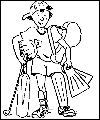 |
1.
There is no semantic difference when shall and will are
used to refer to the simple future. Will can be used in all
persons. In informal spoken English, remember that the affirmative
contraction is 'll and the negative contraction is won't.
There is no contracted form in the interrogative. Examples of usage
might be:
- 'The Government will consider lowering the age of consent
from 16 to 15.' (formal)
- 'I don't know if I can come, but I'll let you know by
Thursday.' (informal)
- 'Where will you be on Thursday? Will you be at
home?' (informal)
Shall is also sometimes used in the first person when it has
the same meaning as will. In informal spoken English, the affirmative
contraction is again 'll and the negative contracted form is
shan't.
- 'I shall never finish this essay - I've still got 2,000
words to write!'
- 'I'll never finish this homework - I'm tired and I want
to go to bed!'
- 'I shan't ever be good enough to go to university -
I just haven't got the brains!'
Shall is often used in questions in the first person singular
and plural when making suggestions, making an offer or asking for
advice:
- 'Shall we go out for dinner tonight?'
- 'Shall I get more tomato juice when I'm at the supermarket?'
- 'What shall we do now? We're clearly not going to get
there by nightfall.'
However, when we want to express a strong intention to do something,
we use will or 'll in the first person singular and
plural:
- 'Is that somebody at the door? I'll just go and see
who it is.'
- 'We'll get the cakes for the coffee morning tomorrow,
Jane.'
- 'No, no. I will. I'm the hostess, after all.'
|
